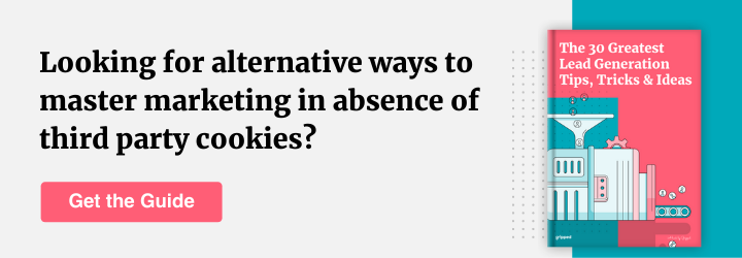The third-party cookie has been a foundation of digital advertising for a number of years, allowing brands to track users browsing habits and use that data to target ad campaigns at the right audience.
However, things look set to change. Increasing awareness of the misuse of the personal data gathered by third-party cookies, and the implementation of privacy laws such as GDPR, has seen Google announce that it will phase out third-party cookies on its Chrome browser by 2022.
Uncertain about how the removal of third-party cookies may affect your strategy?
Book your free audit today. Future-proof your marketing strategy.
As Google Chrome accounts for 67% of the global desktop internet browser market share, replacing third-party cookies with the Google Privacy Sandbox looks set to impact digital advertising fundamentally.
In this article, we’ll be breaking down what exactly the Google Privacy Sandbox is, how it is different from third-party cookies, and what the implications are for B2B Marketing strategies. Let’s get started.
So, what is Google Privacy Sandbox?
While it is still very much in the development phase, we do have a considerable amount of information on the Google Privacy Sandbox and the shape it will take.
The Google Privacy Sandbox will replace third-party cookies with a browsing behaviours tracking system. This system will continue to allow the ads industry to use targeted advertising while protecting the privacy of individual users.

The ‘sandbox’ element refers to the environment in which Google is testing a series of Application Programming Interfaces (APIs), which will eventually underpin a new set of open web standards.
These APIs will function as an intermediary between the user and the advertiser. Theoretically, this means that ads can be targeted at the correct audience without advertisers needing to collect personal data.
The five APIs currently being tested include:
1. Trust Token API
Instead of a third-party cookie, the trust token API would provide the users with a cryptographically secure token that would be stored in the Chrome browser.
This token would validate the user’s authenticity, establishing ‘trust’ that could be forwarded to other contexts without revealing the user’s personal information.
2. Aggregated Reporting API
In order for advertising companies to measure the effectiveness of their campaigns, the Aggregated Reporting API would allow for the measurement of metrics such as reach, views and impressions, all of which would be available on a single report.
The Aggregated Reporting API would keep a significant amount of user information stored on their device only, while providing these critical metrics to an ad tech provider’s specific reporting endpoint.
3. Conversion Measurement API
Similar to Apple’s SKAdNetwork, the Conversion Measurement API would allow publishers and advertisers to see if a user had been converted by clicking on an ad or buying a product that had been advertised — without revealing any specific details about the user.

Since conversion reporting is a complicated process, Google has indicated that they understand that one API won’t be able to handle all ad-related conversion measurement cases.
This means the Conversion Measurement API will probably be a jumping-off point for a range of other conversion measurement APIs.
4. Federated Learning of Cohorts
Federated Learning of Cohorts, or FLoC, is a machine learning technique that will allow Chrome to track user behaviour and place users into ‘interest cohorts’.
These cohorts will allow companies to target relevant ads at groups of people without needing to capture, store, or transmit the data of any individual user. FLoC allows users to preserve their online anonymity, while still allowing for the use of targeted ads.
5. Retargeting
Retargeting will be accomplished by The TURTLEDOVE (Two Uncorrelated Requests, Then Locally-Executed Decision On Victory) proposal.
TURTLEDOVE is an evolution of Private Interest Groups Including Noise (PIGIN), Google’s last attempt at creating a targeted advertising web ecosystem that protected users’ privacy.
Theoretically, TURTLEDOVE will allow advertisers to target users based on certain actions, without giving those advertisers access to specific user data.

Benefits
There is still a degree of uncertainty surrounding the Google Privacy Sandbox, and as a result, a certain amount of disruption is likely. However, at this stage, there still appears to be a number of benefits to Google’s proposed alternative to third-party cookies, including:
- A reduction in the misuse of personal information, which benefits the user, and facilitates a reduction in the reparational damage associated with personal information misuse.
- The Google Privacy Sandbox initiative represents a middle ground between protecting users’ privacy and not completely hamstringing the digital advertising market.
- Given Chrome’s dominance of the browser market, there is a good possibility that these APIs will become industry standard, thereby allowing advertisers to get a more stable view of users across browsers and publishers to monetise their sites without using cookies.
Challenges
Even though there does appear to be a number of potential benefits to the Google Privacy Sandbox, that doesn’t mean it won’t also pose challenges. We won’t know the exact ramifications until the initiative is implemented. However, some issues that may arise as a result of the proposal include:

- Being the architect of this potential new industry-standard puts Google in a position to tip the ad sales revenue scales in its own favour. The UK’s Competition and Markets Authority (CMA) and 10 US states have already announced they will be monitoring the Sandbox for “anti-competitive activities”.
- The Sandbox implementation could result in a drop in ad revenue, potentially forcing publishers to restrict access to content for Chrome users, or find other ways to recoup these potential losses.
- Currently, one of the least developed aspects of the Sandbox is TURTLEDOVE, which calls into question how effective remarketing will be after the 2022 deadline.
- Until it is launched, there is no way to determine how secure the Sandbox will be and what kind of threat bad actors attempting to find ways to access personally identifiable data will represent.
- The potential loss of conversion tracking data also has implications for both Pay Per Click (PPC) advertising sales and the current set of dominant PPC strategies.
B2B Marketing: A future post-cookies
Given the significant changes to digital advertising that the Google Privacy Sandbox looks set to necessitate, it is clear that B2B marketing strategies will need to adapt in order to thrive in a post-cookie environment.
Thankfully, there are some steps marketers can take to reduce their over-reliance on third-party cookies, such as:
- Using last-click attribution: Last click attribution identifies the touchpoint a customer last clicked on before making a purchase, and awards it credit for the conversion. This could potentially combine with the Conversion Measurement API to replace current cookie-based multi-touch attribution methods.
- The revitalisation of other digital channels: Using contextual marketing to target PPC ads based on content, not user behaviour, undercuts the changes made by the Google Privacy Sandbox.
- A diversified marketing strategy: By diversifying into organic traffic generation, paid digital advertising, social media marketing, optimised SEO and producing high-quality content with impactful Calls to Action, companies can reduce their over-reliance on third-party cookies.
- Using First-Party Data: Google still has a lavish spread of first-party data that can be used in targeted advertising. Other companies can follow this example by increasing their first-party data-gathering efforts and building subscriber bases to replace third party data from cookies.
How experts can help
With B2B marketing strategies requiring a significant update to avoid the risk of becoming outdated in the face of the changes Google’s Privacy Sandbox will bring to the advertising ecosystem, there has never been a better time to partner with a professional B2B marketing agency.

With everything from the basics of targeted advertising to measuring the conversion rate of PPC ads seemingly on the line, partnering with specialists offers companies the chance to drive positive outcomes from the transition.
As a leader in the digital marketing strategy space, Gripped offers our partners expert advice and guidance on creating adaptive marketing strategies to overcome the challenges of Google’s Privacy Sandbox. Our team specialises in implementing diverse marketing solutions that will alleviate the impact of Google’s decision to remove third-party Cookies from Chrome.
Start preparing today
With 2022 and the implementation of Google’s Privacy Sandbox right around the corner, many advertisers and publishers are now faced with the reality they may need to adapt in order to survive.
Thankfully, B2B digital marketing agencies like Gripped are standing by to help businesses evolve and optimise their marketing strategies, not only to meet the challenges of Google’s Privacy Sandbox, but to flourish in the new ecosystem it creates.
